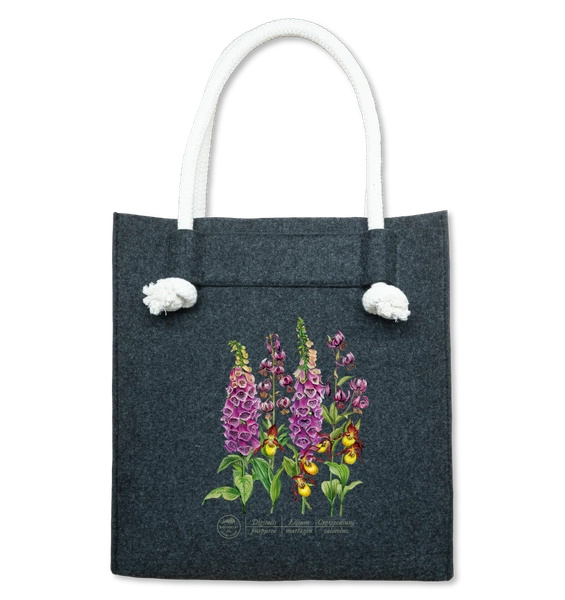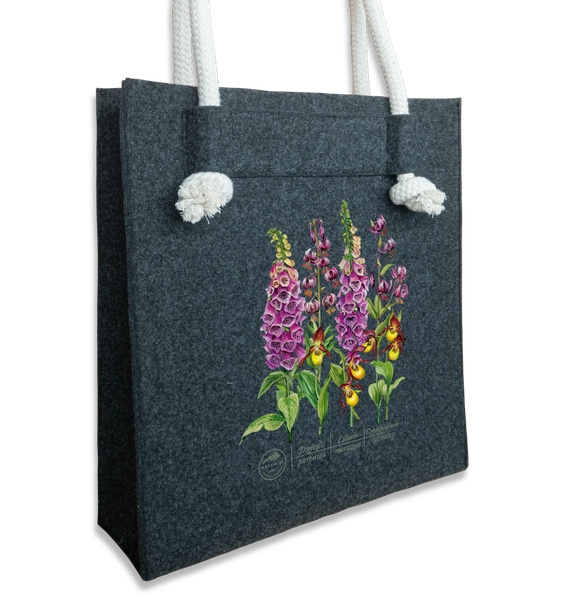Forest flowers — felt bag
- Durable felt bag with a plant motif for a gift for a plant lover, for shopping. Sewn in Poland. An original gift for a gardener, allotment holder.

packaging

designs

quality

gift

shopping

to order
Forest Flowers: Purple Foxglove, Lady's Slipper, Martagon Lily
Digitalis purpurea, Cypripedium calceolus, Lilium martagon
Purple Foxglove: A tall, impressive biennial plant, sometimes perennial — found in the wild in Western Europe. In Poland, it grows in the Carpathians and Sudetes. Its name comes from the shape of the flowers, which resemble a thimble. Flowers growing in the upper part of the stem form a one-sided cluster. Flowers range in color from purple-red, through pink to creamy — with darker spots inside. The tubular bell-shaped floral crown is hairy inside. Foxglove blooms from June to August. The flowers are mainly pollinated by bumblebees.
It mainly grows in bright forests, on forest clearings, at the edges of forests, in fertile soil. The herb of the foxglove is characterized by a high content of glycosides with a very strong cardiac effect. However, glycosides are equally toxic in both fresh and dried plants. Improper use of foxglove herb can lead to poisoning. It causes disturbances in impulse conduction and heart rhythm. Purple foxglove is an ingredient in heart and diuretic drugs. It is also a poisonous plant, therefore its use must be under strict medical control.
Due to its impressive flowers, it is often cultivated in gardens. Suitable for cut flowers. It does not have special soil requirements. Requires a sunny or semi-shady location.
Lady's Slipper: A species of plant from the orchid family (Orchidaceae). The Polish name "obuwik" was given due to the characteristic shape of the lip.
It occurs in Asia and Europe. Its range covers a vast area from Western and Central Europe through Siberia to Korea. The main habitat is in Europe, with one of the larger European populations in Poland. It grows in bright, warm deciduous forests, usually in oak, beech, and hornbeam forests, as well as in thickets and warm grasslands, on soils rich in calcium carbonate. The species tolerates heavy shading and can also grow on steep slopes. Prefers dry and fresh soils, moderately rich in nutrients, most often with an alkaline reaction, less often neutral.
The lady's slipper grows from an underground, horizontal rhizome, forming clumps. Leaves are broadly elliptical, longitudinally folded and sheathing the stem. They are up to 19 cm long and have clearly visible venation. A characteristic feature of the lady's slipper is its flowers, consisting of a burgundy perianth and a yellow lip, typical for the orchid family. Interestingly, its flowers are so-called trap flowers, which keep insects inside for as long as it takes for them to pollinate with pollen brought from other flowers. As they escape, insects must squeeze between the stamen, thereby collecting pollen to pollinate other lady's slipper flowers.
The flowers are distinguished not only by their original color and shape but also by their scent. Their aroma is a combination of sweet vanilla with fresh citrus notes. Interestingly, these flowers produce insect scent analogs, encouraging insects to land on the lady's slipper flowers, thereby enabling their pollination. The species is under strict protection, requiring active conservation.
Martagon Lily: This is a species of perennial plant from the lily family (Liliaceae). It occurs in Europe and Asia. In Poland, it is a rather rare plant and is under legal protection. It is considered one of the most beautiful plants in the Polish flora and one of the most attractive perennials of Polish forests. These impressive bulbous plants can reach up to 1 m in height. Their leaves are elongated, sharply pointed. In the middle part of the stem, they form 2–4 characteristic false whorls. However, the eyes are mainly attracted by its pink, brown-speckled flowers.
The plant blooms from the end of June to July or mid-August. Flowers are clustered at the top of the shoot in the form of a loose cluster. The stamens with intensely orange or purple anthers prominently protrude from the flower. The plant attracts insects not only with its large and colorful flowers but also with its scent. It is especially fragrant in the evening and at night. Only long-trunked insects have access to the nectar, so the flowers of the lily are pollinated only by day and night butterflies, mainly from the sphinx moth family, including the Pachliopta kotzebuea. The martagon lily occurs both in mountainous areas and on the lowlands. It can be found in high mountain meadows, in deciduous, mixed forests, and on their edges. Prefers semi-shaded locations, on moist and fertile soils. However, it is a rare species, under strict species protection. Unfortunately, one of the reasons for the disappearance of martagon lily sites is the picking and digging up of the plant for decorative purposes. According to old beliefs, the martagon lily was a magical plant. It had the power to open all locks, was used as protection against demons, and was used in the manufacture of love potions. It is a frequent decorative motif in the folk art of Podhale, known as "leluja."






